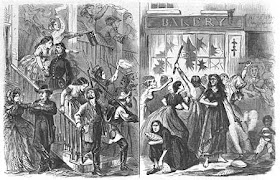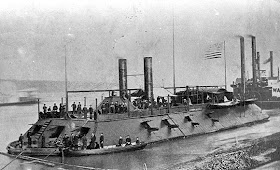
I. The Political Terrain
A. Foreign Policy
1. Great Britain--the British government, under heavy pressure from the US ambassador Charles Adams, seized the gunboat/ram being constructed at the Laird shipyards that could have wreacked havoc with the Union blockade.
2. Russia--the appearence of Russian ships in Union ports on the Atlantic and Pacific coasts (done so they would not be bottled up in the Baltic Sea when the expected war with Great Britain occurred) boosted the confidence of northerners who assumed this meant that Russia would back the North if Great Britain favored the Confederacy in the conflict.
B. Domestic Policy
1. Congress--although the Republican majority in the House was smaller, the Republican Party still controlled the two elected branches of government (the Presidency, as well as both the House and Senate)

C. Friction in the Confederacy--just as dissatisfaction with the course of the ware provided support to the oppostion in the North in the 1862 elections, Confederate dissatisfaction with the war in 1863 cost Jefferson Davis support in the Confederate elections.
1. Lack of political parties--the lack of political parties--or "factions," to recall the term used during the Early National period--was viewed as a strength of the Confederacy by contemporaries. Historians have come to view this as a weakness, however, because political parties served to focus support for particular political program--or to serve as a focused way to work against that political agenda; without political parties, controversial policies simply divided the government.
2. Centrifugal force of States Rights--besides the issue of slavery, the only other political program popular in the South was the supremacy of state's political agenda over the national government's--States Rights. Because of deeply held political ideal, it was challenging for the national government--the Confederacy--to get the various states to live up to their obligations. This became particularly evident as the war began going badly for the South.
3. Growing Peace Movement--the Confederacy was never the monolithic "Solid South"; there were always pockets of resistance to the war wherever slavery was unimportant to the local economy--and therefore where there was little support to fight a war to keep that institution.
a. Wartime inflation--a barrel of flour in Richmond, for instance, cost $100 by the fall of 1863; other materials were even higher
b. Defeat at Gettysburg--demoralized much of the civilian population of the region, especially after a string of Confederate victories seemed to promise victory in the near future.
c. Strongest Confederate government support came from those Congressmen sitting from states largely under Union control, or which had never left the Union--who were willing to "go to the last ditch" because they had no stake in surrender.
II. Reconstruction--is generally assumed to have begun after Appomattox, when the military struggle ended; but it is now recognized that the political groundwork for reconstruction began much earlier.
A. Three Plans for Reconstruction
1. Pro-Confederate Plan--called for Lincoln to rescind the Emancipation Proclamation, offer general amnesty to all rebels, and pretend the whole episode never happened.
2. Conservative Republican plan--insist on southern acceptance of the emancipation of slaves, but made few other demands that former Confederates would have to meet. With this generous plan, conservatives expected that individual southerners would surrender quickly and overthrow the leadership that led them into the war.
3. Radical Republican plan--sought equality for African Americans with white southerners, and to completely reorganize Southern society to achieve this aim.

a. Thaddeus Stevens--argued that the seceded states should be treated as conquered territory, and that property be confiscated and distributed to poor loyal southern whites and African Americans.

b. Charles Sumner--argued that seceded states "gave-up" all claims to statehood, and that their fate should be determined by Congress--just like territories.
B. Republican schism--these differing visions over reconstruction by Republicans threatened party unity--and the parties ability to carry out a reconstruction plan.
C. Lincoln's Vision of Reconstruction
1. 1863 Amnesty Proclamation--Lincoln sent an Amnesty Proclamation with his 1863 message to Congress, laying out his proposal on the treatment of rebellious individuals.
a. "... full pardon ... with restoration of all rights of property except as to slaves." Confederate government officials and high-ranking military officers (above colonel) were excepted from this pardon. To be granted this pardon, former rebels would also have to take a loyalty oath to the Constitution, and to pledge to obey acts of Congress and presidential proclamations relating to slavery.
2. 1863 Message to Congress--served as a sort of state of the union address. The early part of the message was a simple recounting of the accomplishments of the Lincoln administration; much of it was written by cabinet officials, and combined into a single document. The end of the document, however, laid out Lincoln's proposals for reconstruction.
a. Pledged to uphold the Emancipation Proclamation, but at the same time did not propose and ending for slavery in the loyal border states. Lincoln also promised that no slave freed by military conquest or the Proclamation would be forced back into slavery--as long as the Supreme Court decided that Lincoln did not exceed his authority in doing so.
b. Proposed to allow states that had seceded, but since come under Union control, to reorganize politically if ten percent of the population that had voted in the 1860 election took a loyalty oath and petitioned to form a new government. This "Ten Percent Solution" raised few concerns among Republicans initially, but Democrats accused Lincoln of a bald power grab, particularly since a reconstructed Arkansas or Louisiana could have as many electoral votes as the state of Ohio or Indiana.
3. Lincoln's changed perception of the war--Lincoln had long believed that most Southerners were simply led astray by their political leaders; this view began to change as the reality that many Southerners willingly were led to rebellion began to take hold.
a. Military Districts--when portions of southern states were reclaimed, they were divided into military districts to provide basic services (police protection, as well as an occupying force to ensure that rebel forces did not retake an area). Lincoln also moved loyal civilian officials into these areas, to begin the process of reintegrating them into the US body politic. In practice, many of the civilian officials were fiercely loyal to Lincoln, and came under some criticism--as did their boss--for their political activity on the part of Lincoln.
b. Reconstruction as a wartime expedient--for Lincoln, reconstruction served not only as a vision for transforming the postwar South, but also as a way to try to persuade Southerners to lay down their arms.
D. Splitting the Difference--as was his usual practice, Lincoln gave each side in the Republican Party something that they could claim as being cognizant with their own position--and thus to support his own position.
1. Conservative Republicans--could claim that Lincoln agreed with their position that the war was provoked by the disloyalty of individual Southerners; they had to pledge their loyalty as individuals, and leaders of southern society (politicians and military officers) were to be treated differently, reflecting their greater responsibility in the rebellion.
2. Radical Republicans--could also claim the President was sympathetic to several of their positions.
a. Promised that Southerners would have to accept emancipation of slaves as an essential condition for reconstruction.
b. Promised that freed slaves (via the Emancipation Proclamation) would never be restored to their masters.
c. Requirement that all citizens in seceded states be required to take an oath of loyalty before partaking in any rights of citizenship satisfied radicals on the issue over how to distinguish loyal from disloyal.
3. Effect of the Statement--miraculously, this statement appeased both wings of the Republican Party, as well as a fraction of War Democrats, and helped Lincoln stave off challengers from both within the party as well as a Democratic challenger in 1864.



































